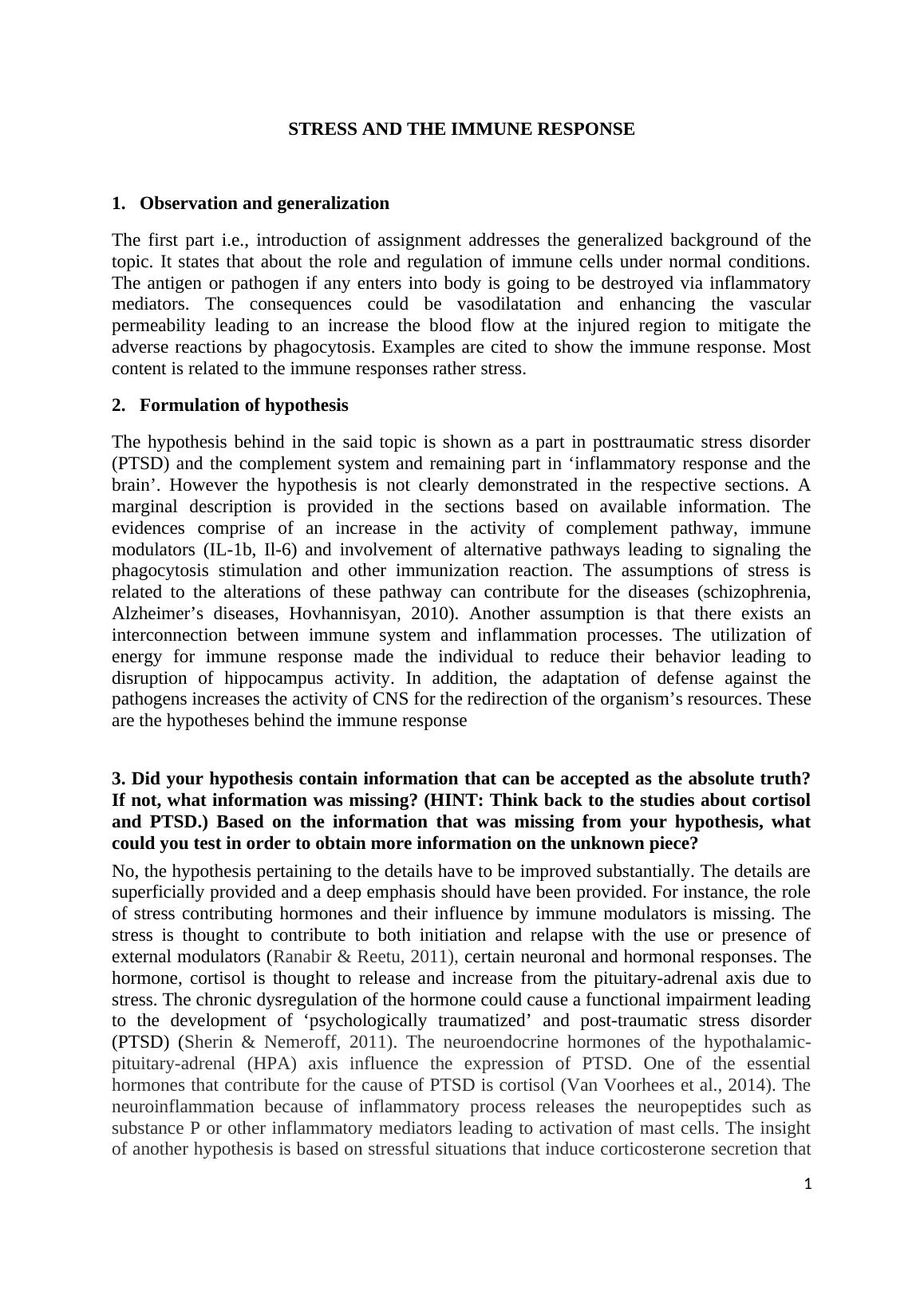Ask a question from expert
Stress and the Immune Response
3 Pages1394 Words262 Views
Added on 2019-09-30
Stress and the Immune Response
Added on 2019-09-30
BookmarkShareRelated Documents
STRESS AND THE IMMUNE RESPONSE1.Observation and generalizationThe first part i.e., introduction of assignment addresses the generalized background of thetopic. It states that about the role and regulation of immune cells under normal conditions.The antigen or pathogen if any enters into body is going to be destroyed via inflammatorymediators. The consequences could be vasodilatation and enhancing the vascularpermeability leading to an increase the blood flow at the injured region to mitigate theadverse reactions by phagocytosis. Examples are cited to show the immune response. Mostcontent is related to the immune responses rather stress.2.Formulation of hypothesisThe hypothesis behind in the said topic is shown as a part in posttraumatic stress disorder(PTSD) and the complement system and remaining part in ‘inflammatory response and thebrain’. However the hypothesis is not clearly demonstrated in the respective sections. Amarginal description is provided in the sections based on available information. Theevidences comprise of an increase in the activity of complement pathway, immunemodulators (IL-1b, Il-6) and involvement of alternative pathways leading to signaling thephagocytosis stimulation and other immunization reaction. The assumptions of stress isrelated to the alterations of these pathway can contribute for the diseases (schizophrenia,Alzheimer’s diseases, Hovhannisyan, 2010). Another assumption is that there exists aninterconnection between immune system and inflammation processes. The utilization ofenergy for immune response made the individual to reduce their behavior leading todisruption of hippocampus activity. In addition, the adaptation of defense against thepathogens increases the activity of CNS for the redirection of the organism’s resources. Theseare the hypotheses behind the immune response3. Did your hypothesis contain information that can be accepted as the absolute truth?If not, what information was missing? (HINT: Think back to the studies about cortisoland PTSD.) Based on the information that was missing from your hypothesis, whatcould you test in order to obtain more information on the unknown piece?No, the hypothesis pertaining to the details have to be improved substantially. The details aresuperficially provided and a deep emphasis should have been provided. For instance, the roleof stress contributing hormones and their influence by immune modulators is missing. Thestress is thought to contribute to both initiation and relapse with the use or presence ofexternal modulators (Ranabir & Reetu, 2011), certain neuronal and hormonal responses. Thehormone, cortisol is thought to release and increase from the pituitary-adrenal axis due tostress. The chronic dysregulation of the hormone could cause a functional impairment leadingto the development of ‘psychologically traumatized’ and post-traumatic stress disorder(PTSD) (Sherin & Nemeroff, 2011). The neuroendocrine hormones of the hypothalamic-pituitary-adrenal (HPA) axis influence the expression of PTSD. One of the essentialhormones that contribute for the cause of PTSD is cortisol (Van Voorhees et al., 2014). Theneuroinflammation because of inflammatory process releases the neuropeptides such assubstance P or other inflammatory mediators leading to activation of mast cells. The insightof another hypothesis is based on stressful situations that induce corticosterone secretion thatin turn reduces the immune reactions via diverse mechanisms (Stier et al., 2009). Both the1

End of preview
Want to access all the pages? Upload your documents or become a member.
Related Documents
Stress and the Immune Responselg...
|5
|1098
|460
Pathogenesis of Urinary Tract Infection and Nursing Strategieslg...
|6
|2172
|81